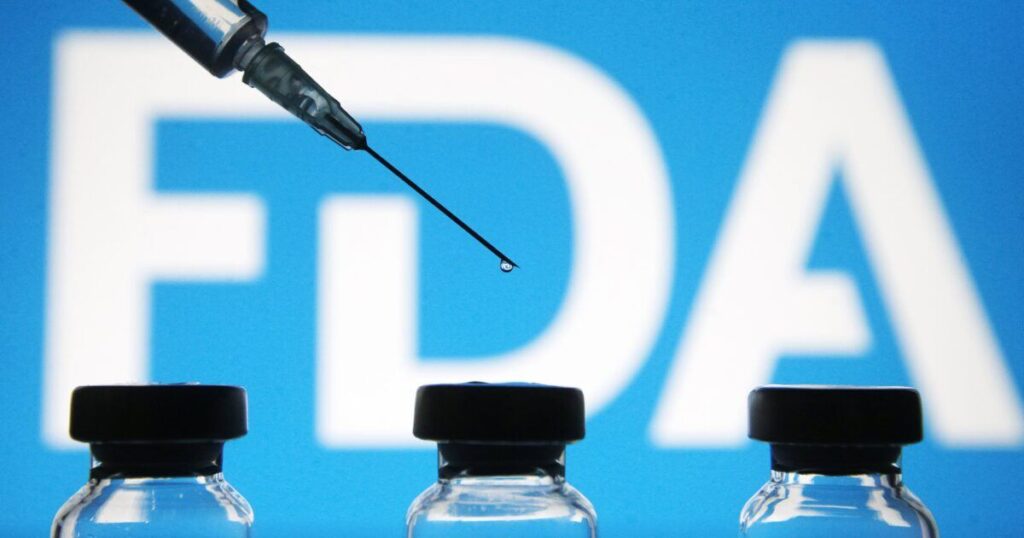🔴 Website 👉 https://u-s-news.com/
Telegram 👉 https://t.me/usnewscom_channel
The Food and Drug Administration (FDA) last week approved Moderna’s ‘next-generation COVID-19 vaccine’ for adults 65 and older and individuals 12 to 64 with at least one underlying condition.
Medical analyst John Campbell, Ph.D., expressed his disappointment about the agency’s approval of the mRNA jab.
“I think we have to assume that the American bureaucracy and the FDA is more of an oil tanker, which is going to take a while to turn around, rather than a sailing yacht, which can tack quickly,” Campbell said, according to The Defender.
Campbell revealed an alarming serious adverse event rate for the jab.
🚨 FDA Approves New Moderna COVID Vaccine — Clinical Trials Show It Causes Serious Adverse Events in 2.7% of Recipients
Given the high risk and very limited benefit, John Campbell, Ph.D. said he was disappointed the FDA had approved the drug. “Maybe this reflects the massive… pic.twitter.com/jouq3eU2qr
— Children’s Health Defense (@ChildrensHD) June 4, 2025
The Defender reports:
Reviewing the package insert, Campbell said the vaccine caused serious adverse reactions in 2.7% of clinical trial participants.
“I would not dream in clinical practice of giving a treatment that had a 2.7% risk of serious adverse events unless there was a really big risk, and there was a really big risk-benefit analysis,” he said. “So if the patient is about to die of something, of course it’s an acceptable risk. But for any benefit you would get from this — 2.7%, I just find it bemusing that this could possibly be authorized.”
Campbell said data show exponentially more adverse reactions reported following the COVID-19 vaccines than any other vaccines, including 118 times more than the flu vaccine. “How this can be approved is rather a mystery to me,” he said.
He also noted that the trials for mNEXSPIKE didn’t test the vaccine against a placebo. Instead, it was tested against Spikevax, Moderna’s previous COVID-19 mRNA vaccine, and it showed slightly higher efficacy. The trials didn’t test for efficacy against illness, hospitalization or death. Instead, they measure whether the vaccine triggered neutralizing antibody titers.
Campbell’s analysis focused on the new information on the package insert about myocarditis and pericarditis. He said the label reports a “confirmed risk” of myocarditis and pericarditis, which is higher in males ages 12-24. The onset of symptoms typically occurs in the first week following vaccination.
Some people who experience these conditions have required intensive care. The insert says that for most people, the symptoms resolve, but others have shown persistence of cardiac injury five months post-vaccination.
“I want to address those of you who have anxieties about @US_FDA’s limited approval of a new mRNA COVID vaccine for high-risk populations. Moderna has agreed to a true placebo-controlled trial of the new vaccine, which is similar to the existing mRNA vaccine but uses a smaller protein,” Health and Human Services (HHS) Secretary Robert F. Kennedy Jr. said.
“The FDA will monitor and collect data throughout the trial for every adverse outcome—not just a table list of expected outcomes. FDA will scrutinize every aspect of the trial. We will deliver on our promise to use gold standard science and common sense,” he added.
I want to address those of you who have anxieties about @US_FDA’s limited approval of a new mRNA COVID vaccine for high-risk populations. Moderna has agreed to a true placebo-controlled trial of the new vaccine, which is similar to the existing mRNA vaccine but uses a smaller…
— Secretary Kennedy (@SecKennedy) June 3, 2025
“Out of 100 people who take this new injection between two and three will be seriously injured,” Dr. Naomi Wolf commented.
Out of 100 people who take this new injection between two and three will be seriously injured. @SecKennedy. https://t.co/XsboYA58BV
— Dr. Naomi Wolf. 8 NYT Bestsellers. DPhil, Poetry. (@naomirwolf) June 3, 2025
Per the FDA:
Serious Adverse Events
Serious adverse events were reported by 2.7% of participants (n=156) who received
MNEXSPIKE and 2.6% of participants (n=151) who received the comparator vaccine through a median follow-up of 8.8 months. There were no serious adverse events considered causally
related to MNEXSPIKE.There were no notable patterns or imbalances between treatment groups for specific categories of serious adverse events that would suggest a causal relationship to MNEXSPIKE.
